Plastic Solutions
Plastic pollution is one of the world's major growing concerns for life and health--we have likely all seen footage of marine animals being strangled and killed from plastic trash that we have dumped into their ecosystem. But this is not the extent of the plastic problem: the problem is, in fact, coming right back to the mainland to bite us for our mistakes. According to Plastic Oceans, the world is currently manufacturing 300 million tons of plastic each year, but the World Economic Forum estimates that only 9% is being recycled. Moreover, the plastic which is recycled continues to shed microplastics into the environment. A 2019 study conducted in Australia found that an average person might inhale enough plastic particles every week to make a credit card. Scientists point out that children are likely at even greater risk because their respiration is at a faster pace. Not even infants are immune. Microplastics can pass into the bloodstream; from there, they pass through a mother's placenta to infect developing babies, and they even contaminate breast milk.
Plastics are now known to cause a number of diseases:
- Attention Deficit Disorder
- Dementia
- Learning disabilities
- Prostate and testicular cancers in men
- Testicular problems in young men
- Breast and ovarian cancers in women
- Endometriosis
- Cardiovascular diseases
- Inflammation and immune disorders (auto-immunity)
- Digestive problems
- Diabetes
- Metabolic syndrome (i.e. belly fat)
- Asthma
- Allergies
- Eczema
- Premature wrinkling of the skin
- Premature graying of the hair
- Hepatic (liver) diseases
- Kidney diseases
- Bladder diseases
This is only a partial list, as research is still uncovering more problems as time passes. So! Food should not come into contact with plastic. End of story. But as it turns out, food keeps much better wrapped in damp cotton cloth in the refrigerator. I once forgot a zucchini for 2.5 weeks, but it was wrapped in cloth and still looked as fresh as the day I purchased it.
In our clinic, we strive to use a minimum of plastic and other single-use items, and we reuse whenever possible. As individuals, we can all take steps to reduce the volume of plastic we rely on. Start with your grocery shopping--it is likely something you do often, so any forward step in this area will make a real impact.
Bags
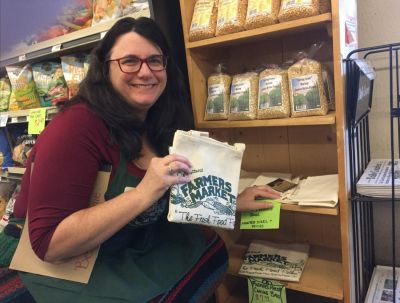
Supplying your own canvas or other non-plastic bags, or a basket, is an easy first step. In late 2019, Oregon passed a measure outlawing plastic bags, and it will soon go into effect--bravo! But beware of the solution many corporations are offering and will likely push even more in the near future: do not go in for the petroleum-based bags they will try to sell you. They inevitably break down into plastic particles. Instead, look for cotton canvas, muslin, or other natural-fiber bags. Farmer's Market in Grants Pass sells nice, sturdy ones. Both Farmer’s and Gooseberries also carry beautiful baskets from West Africa, which last for years and years and years. Procure at least three carrying containers so that you can always have a backup, and keep them in your car at all times. If you forget to put one back in the car after bringing groceries into your home, your backups will do the job. If you forget to bring them into the store with you, tell yourself that disposable bags are never an option, and you will get in a few more steps by returning to your car to fetch the bags! Even paper bags are not ideal; they sustain our dependency on products made from trees, which we need to decrease in an effort to slow down global warming.
Food, Cleaning Items, and More
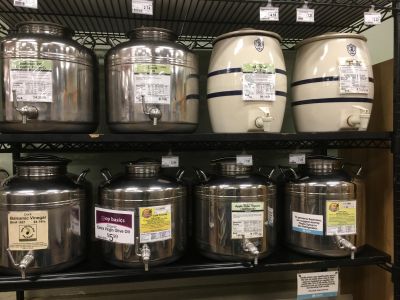
When you are ready for more planning ahead in your plastic-free shopping, start looking for items available in bulk and packaged in something non-plastic. This is where Gooseberries, Farmer's Market, and the Medford and Ashland Food Co-ops do an exceptional job; their bulk sections are well-stocked with many options. (Incidentally, some of these stores also provide a stash of cardboard boxes for you to carry your purchases in.)
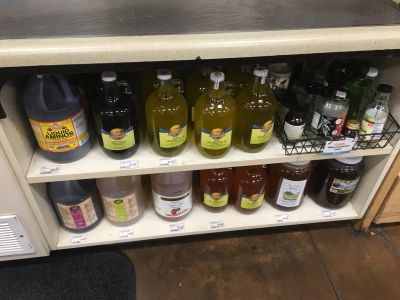
You can find a variety of typical bulk items such as grains, beans, dried fruits, salts, and wheat/alternative flours. However, these stores are also now stocking more unusual items that are very helpful to our goal of ending plastic dependency: cooking oils, syrups, vinegars, and even various soaps are now to be found marching down the bulk aisle at grocery stores in Josphine and Jackson Counties. Household alternatives to the bulk aisle are baking soda (dental hygiene), shampoo bars (usually wrapped in paper instead of plastic), soap nuts (a natural laundry detergent), and borax (another natural laundry cleaner).
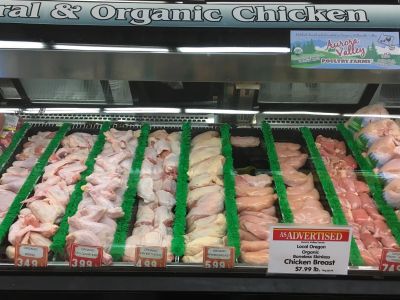
For plastic-free meat, Cartwright's in Grants Pass and Medford allows you to bring your own containers for their in-cooler meats. Some of their meats are organic, as well.
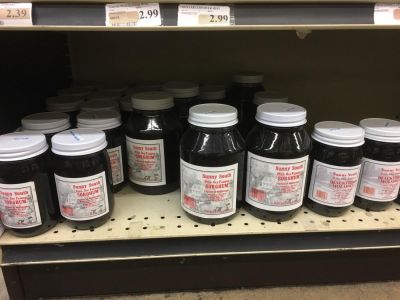
Farmer's Market and Gooseberries in Grants Pass also carry a few items that are in glass jars and have metal lids. The brand of molasses pictured here doesn't even have a plastic seal around the cap; the lids are heat-sealed on, just as we did it for years and years before the last few decades. Look for mustards and other condiments with similar packaging strategies.
Bulk Containers and Other Storage
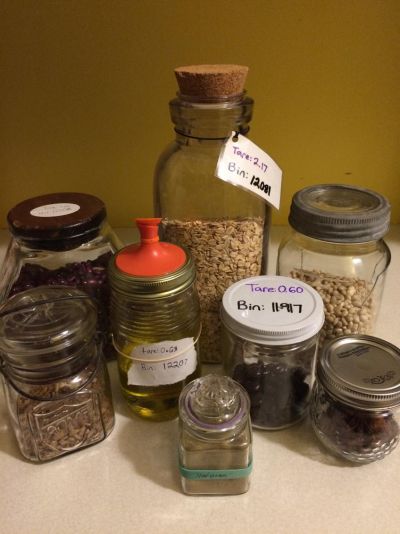
One unfortunate problem with Oregon's new mandate outlawing plastic bags is that it does not include bags used in the bulk section. We can do something about that oversight, though! All of the above grocery stores allow you to bring your own containers and will even measure tare weights for you prior to filling. The Grants Pass Grower's Market (on Saturdays) also is an easy place to purchase high-quality, organic produce that does not come in plastic. You can use canning jars, lock-lid jars, fabric bags--the possibilities are endless and can be quite fun to source.
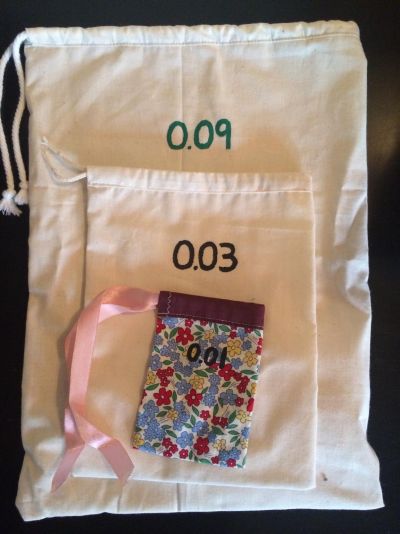
When I was in my twenties, my great-grandmother left me some cotton cloth from the now old-fashioned towels in public bathrooms. I cut and sewed these into little drawstring bags to store my food, using natural string to close them. Now, I purchase such bags from Sunshine Natural Foods or the Farmer’s Market on Rogue River Highway. At our clinic, we sell sets of cotton drawstring bags to be used for bulk purchases. Each bag has its tare permanently marked, making them easy to use.
Besides bags, hang onto used peanut butter jars and other glass items, especially ones with a wide mouth (they're easiest to fill from a bulk bin). Keep an eye out for useful containers at thrift stores, antique stores, and yard sales, and you will do the planet the extra favor of not consuming a brand-new product for which a solution already exists (and save yourself some money). For marking tare weights and bin numbers, you can rubber-band a piece of paper to your container. You can also write the tare in permanent ink on the lid or other noticeable surface, then use a dry-erase pen to note bin numbers. One of our staff carries a dry-erase pen at all times in her purse so that she can easily note bin numbers on her pre-weighed containers. If you are feeling crafty, you can make an easy dry-erase tag by writing "Tare," the tare weight, and "Bin" in permanent ink on a small piece of paper. Use packing tape to seal the tag, punch a hole through it, and tie it to your container.
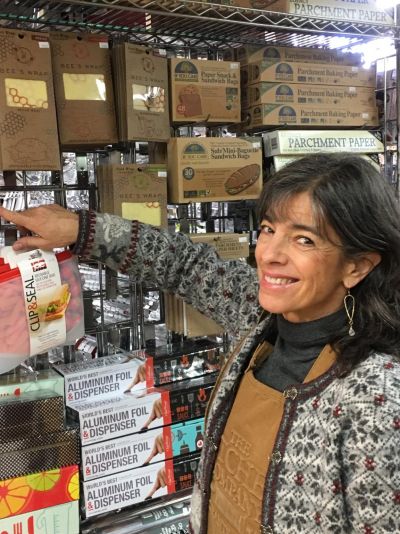
For storage at home, beeswax wraps are an excellent alternative to plastic wrap and even aluminum foil. They are available at The Kitchen Company in Grants Pass, easy to source online, and last for several years when properly cared for. The Ashland Food Co-Op and Fred Meyer sell Egyptian cotton towels, which, when kept damp, are another useful wrapping for raw fruits and vegetables. Glass and metal storage containers are also becoming more widespread and easy to find. Even regular department stores usually carry several options!
Eating Out
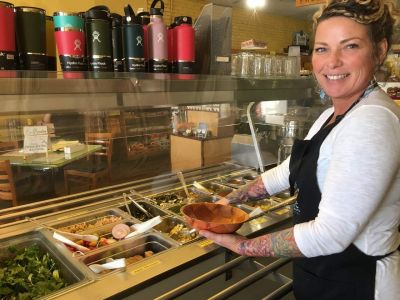
Now that we've covered groceries, what can we do about restaurant food? You can keep a container in your car for leftovers; metal is a good choice, since it won't break if it rolls around in the car. And Sunshine Natural Foods in downtown Grants Pass offers a healthy lunch deli that is easy to assemble quickly to your taste.
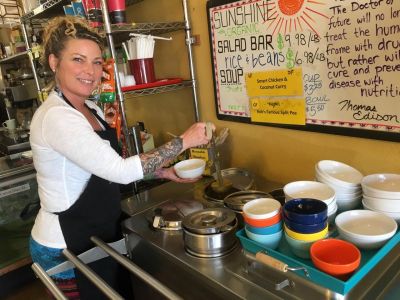
They use metal cutlery and reusable plates and bowls, so even though it's sort of an organic equivalent of fast food, there is no disposable waste.
Styrofoam
Now--what to do about styrofoam? It is very unfortunate that the new state law does not address this product, either. Right now, our best option is to avoid using styrofoam whenever possible. The second alternative is to take it to Agilyx Corp in Tigard, OR, for recycling. Several retailers in northern Oregon also accept hard styrofoam (the kind that snaps when bent and usually has a 6 inside its triangle marker) for recycling, including Fresh Start Market in Salem and St. Vincent de Paul in Eugene.
In Eureka, the community has decided to work towards zero waste. We, too, could decide to have a zero-waste and plastic-free market in Grants Pass as time goes on. It is up to us. The petro-chemical barons have no interest in reducing something that makes them very, very, very rich. Coca-Cola, for example, makes enough plastic bottles EVERY YEAR to circle the earth 700 times over. As our numbers increase, so does the plastic. OR--we can change.